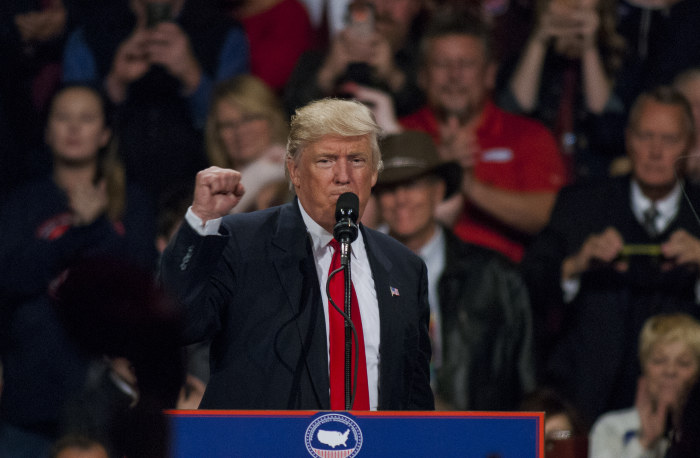Herb Strentz was inspired by emails from President Donald Trump’s re-election campaign and recent writing by progressive rural organizer Matthew Hildreth. -promoted by Laura Belin
This post is for PATRIOTS ONLY and is not intended to be shared.
Pardon that opening; please go ahead and read and share, if you want. But the “for PATRIOTS ONLY” line occurs often in the six to ten emails I receive daily from the President Donald Trump, his relatives, and his re-election campaign.
Don’t know how I got on the mailing list — maybe a joke from a friend. But I thought I’d save the notes for a while to see if I could fashion something to share with Bleeding Heartland patriots.
As an antidote to the emails, however, I reviewed some issues of Sojourners, one of the two Christian magazines that had denounced Trump. (The other was the more conservative Christianity Today.)
In June, Sojourners published an article by Matthew Hildreth called “Organizing the Heartland.” Hildreth is director of Rural Organizing, a national organization working for “progressive change in rural America.” He was hooked into such work when, while working for Sojourners, he covered the community response to the Immigration and Customs Enforcement raid at a Postville, Iowa, meatpacking plant in May 2008.
I thought offering a contrast between the Trump emails and Hildreth’s community orientation made more sense than just finding acerbic things to say about the emails.
So be our guest and take a look at the contrasts and draw your own insights and thoughts. For ease in reading the excerpts are alternated and sources are given.
Trump: The truth is, the Democrats HATE you, Herb, and they hate everything you stand for. The Coastal Elites, the Fake News media, and the Radical Left all thought that they could silence your voice with intimidation…
Battling the Fake News media and their Democrat Partners hasn’t been easy. In fact, they’ve tried to make it impossible for our movement to succeed, but as long as I have you on my team, I know we’ll WIN BIG.
Hildreth: The solution to propaganda isn’t better propaganda. The solution to propaganda is authentic, organic relationships. Communities that have invested in building authentic bonds across traditional cultural divides have created civic resilience that enables them to make progress at the local level, despite the current partisan climate.
Trump: President Trump recently signed an Executive Order to put America FIRST by blocking illegal aliens from receiving congressional representation and being counted in the U.S. Census. He’s selected 75 of his BEST supporters to receive an Official Donald J. Trump Fine Point Marker – an exact replica of the pen he used to sign this important Executive Order – and YOU are one of them. Just contribute $23 in the NEXT HOUR to claim yours NOW.
Hildreth: Community organizers […] solve local and global problems by creating unity and affirming diversity among seemingly unrelated groups of individuals. We know if we empower and equip rural leaders to build local relationships […] develop positive political agendas that prioritize their interests, and mobilize support for legislation, they have the experience and expertise to develop rural-specific solutions for rural-specific problems and rebuild rural communities that are empowered, thriving, and equitable.
Trump: OLD GLORY is to be revered, cherished, and flown high. That’s why anytime I witness a player kneeling during the National Anthem, a sign of great disrespect for our Country and our Flag, the game is over for me.
I know that real Americans, like YOU, will ALWAYS stand up straight and tall for our magnificent Anthem.
Hildreth: (M)uch of the media has embraced President Donald Trump as a defining symbol of rural America. They developed analyses based on stereotypes that rural people are white, conservative, and dumb and ignored anyone who didn’t fit the narrative. Instead of providing rural-specific solutions to rural-specific problems, such as a lack of access to health care, candidates create campaign strategies based on stereotypes. On the Right, politicians… ignite fears among the rural electorate to promote their own political agenda. On the Left, Democrats fall for stereotype-based punditry, with political candidates either ignoring rural voters or watering down progressive messages to seem more like Republicans…But most of the stereotypes of rural voters are wrong. Rural doesn’t mean white. The majority of Indigenous Americans (54 percent) and a quarter of African Americans live in small cities towns and rural communities.
Trump: Herb, Because of your unwavering loyalty and dedicated support, YOU were identified as one of the few Patriots who qualified for the Trump Donor Hall of Fame. This is a HUGE accomplishment. Congratulations!
All you have to do is make a contribution of ANY AMOUNT and you’ll automatically have your name displayed among the best of the best in the Trump Donor Hall of Fame. WARNING: Your offer is set to expire TONIGHT.
Humbled by that recognition, but declining the invite, I thought a good way to wrap this up would be to quote from another item in that Sojourners issue, a commentary on a poem by Alice Walker called “The New Dark Ages.”
After noting the appropriateness of the poem’s title for today’s despair and that it was dedicated to Martin Luther King, Jr., Jeania Rae V. Moore —a Methodist worker for faith-based social justice, in DC,—writes:
Yet, in this darkness, despair is not a dead end to faith or justice, but a starting point…King’s path appears beckoning our doubting, fearful selves on with the reminder (from)…a Sunday school song made famous by the civil rights movement: In times of darkness, we are the light.
Herb Strentz was dean of the Drake School of Journalism from 1975 to 1988 and professor there until retirement in 2004. He was executive secretary of the Iowa Freedom of Information Council from its founding in 1976 to 2000.
Top image: Mark Reinstein’s photo of President-elect Donald Trump at a victory rally in Des Moines on December 8, 2016, available via Shutterstock.

